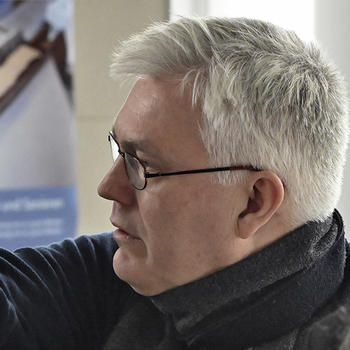Dr. Jan J. van Ginkel (until 06/2024)

Seminar für Arabistik
CRC Project C10 "Verses and Sayings. Impetus and Range of Scholarly and Popularising Discourses in the Arabic World"
Affiliated Fellow LIAS/SMES, University of Leiden (1 February 2010-Present)
Research Fellow VU Theology, Syriac Alexander Romance (1 April 2013- 31 march 2016)
Replacement University Teacher Ancient History at the University of Leiden (1 September 2009- 1 February 2010)
Research Fellow at the University of Leiden. Project: `Michael the Syrian and His Sources' (1 October 2002 - 2008), member of NWO-PIONIER-project "The Formation of a Communal Identity among West Syrian Christians (451-1300)"
(ad interim) University Lecturer (Syriac and Eastern Christianity) at the University Leiden (1 September 2005 - 2007)
Grotius Research Fellow at the University of Utrecht. Project: `The Christian Chronicle in the Middle East: a Study of Genre, Tradition and Identity' (1 September 2000 - 31 August 2002)
Research Fellow of Netherlands Organization for Scientific Research (NWO) Project: `Corpus of Letters by Jacob of Edessa (633-708)' (1 September 1996 - 31 May 2000) (at University of Groningen)
Teacher (Latin) at Maartens College Groningen (28 August 1995 - 1 December 1995)
Research Assistant of Netherlands Organization for Scientific Research (NWO) Project: `John of Ephesus' (1 March 1991- 28 February 1995) (at University of Groningen)
Within the SFB 980 "Episteme in motion" J. van Ginkel works on the subproject: Verses and Sayings. Impulse and Reach of Scientific and Popularizing Discourses in the Arabic-Speaking World.
The subproject examines micro-texts in poetry and gnomics in Arabic and related traditions such as Syriac and Greek, i.e. individual verses and sayings of wisdom that have entered popular and scientific discourses across centuries and language borders. On the basis of the circulation of these micro-forms and the modes of condensation they have undergone in their respective literary or scientific contextualizations, it is possible to unlock moments of reciprocal knowledge transfer. The model-like microstructural analysis of the modes of appropriation and transfer as well as the different contextualizations makes it possible to trace the interaction of multiple factors and impulses of epistemic change movements in other contexts as well.
Within Kalīla and Dimna, J. van Ginkel is in charge of researching variants of this text in the Syriac tradition.
This Mirror of Princes in the genre of animal fables is an important predecessor of Niccolò Machiavelli’s Il Principe. Nonetheless has it been studied mainly by Medievalists, exploring the translations into some fifty languages later to become the models to Jean de La Fontaine’s Fables.The Kalīla and Dimna is of Sanscrit origin and has reached the Arabic context via a Middle Persian translation now lost. The wildly diverging variants of the Arabic tradition evidently are little suited for a conventional critical edition. Instead, a representative choice from different manuscript clusters (of 80 manuscripts hitherto known) are being presented alongside each other by means of an electronic synopsis. This will allow to visualize details about textual genesis and tradition lines, as well as further research into socio-historical motifs and triggers.
We know of a Syriac-Aramaic translation/redaction of the lost Middle Persian copy, and there is a Syriac-Aramaic version of a rather early Arabic text variant. Comparative analysis will lead to an insight into tradition and early stages of the book.